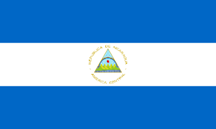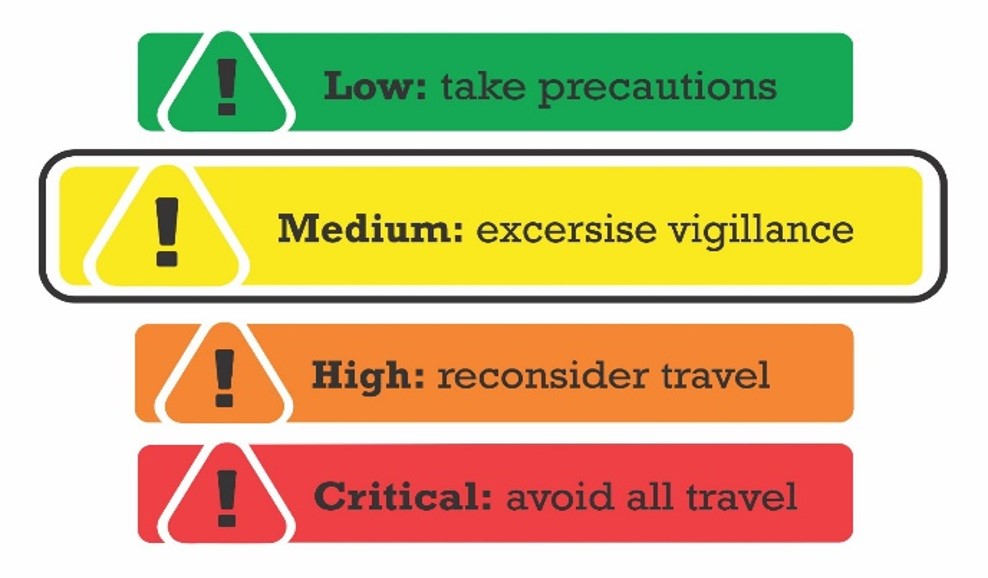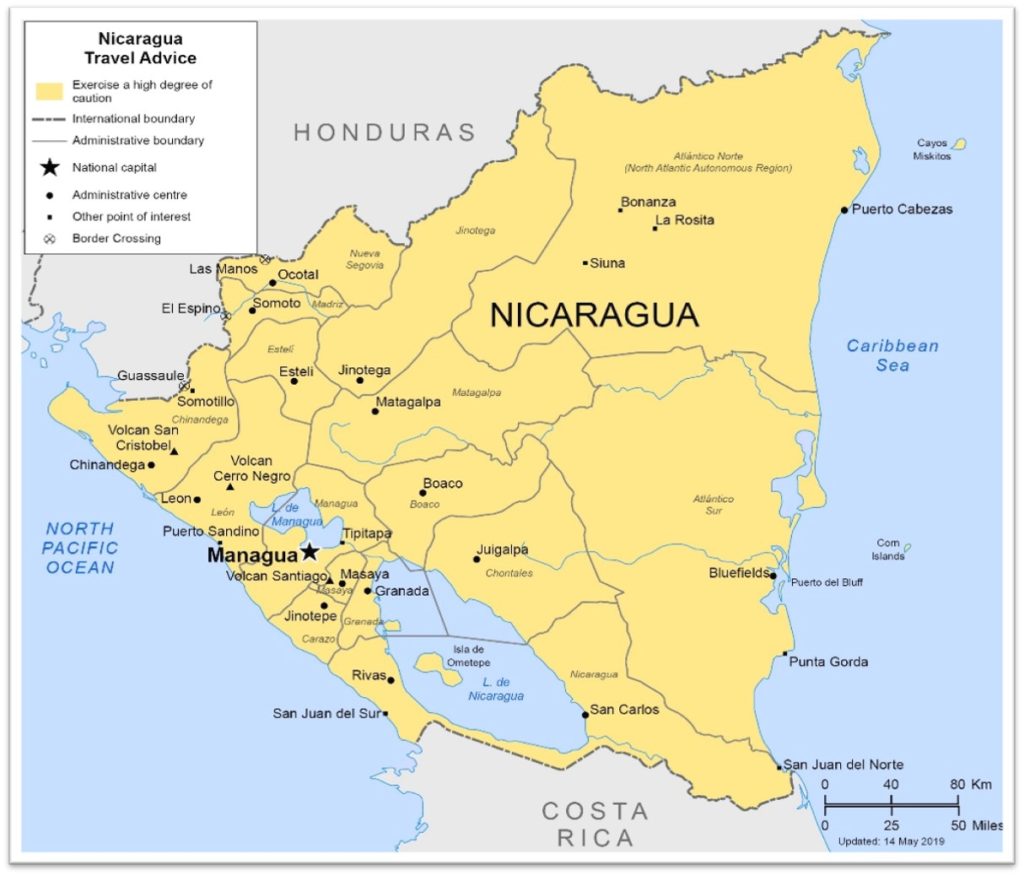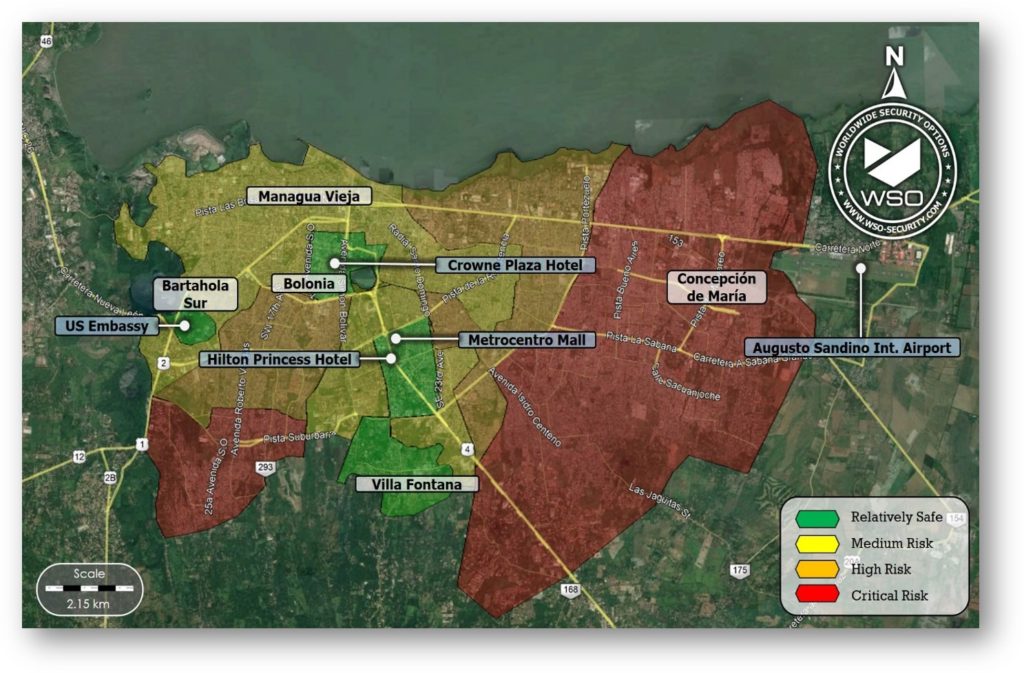| Official Name: | Republic of Nicaragua |
| Official Language: | Spanish |
| Area: | 130,373 km2 (43,433 sq mi) |
| Population: | 6,351,960 |
| Time Zone: | UTC−6 |
| Capital City: | Managua |
| Elevation (Managua): | 83 m (272 ft) |
| Currency: | Córdoba nicaragüense (NIO) |
| Main Cities: | Managua, León, Masaya |
| Main Port: | Port of Corinto |
| Required visa for entry: | Nationals from Canada, EU countries, and the UK and others DO NOT require visas. Click here for more information concerning visa requirements. |
| Required vaccination for entry: | Yellow fever (only for endemic countries. Review epidemiological alerts by clicking here). |

Main Risks:
Theft, robbery, kidnapping, extortion, rape, drug and human trafficking, fraud, vehicle assault.
Executive Summary
Nicaragua features intermediate and high risks depending on the area of the country. Security risks increase considerably in remote and border areas beyond the main urban areas, as well as in impoverished neighborhoods of Managua. Given that even common criminals are heavily armed, and the political stability in the country is not necessarily guaranteed, we strongly advise procuring secure transportation services for all kinds of trips to Nicaragua. If the itinerary involves business or high-profile meetings, we also recommend hiring executive protection services.

General Risk Level: MEDIUM.
The risk generally remains stable throughout the country. That said, travelers should avoid non-essential travel through high-risk areas, including remote and jungle areas, and impoverished neighborhoods in urban areas with little police control. Avoid non-essential travel to the South Caribbean Coast Autonomous Region. It is necessary to review security considerations before traveling to Nicaragua, preferably under the supervision of reputable security professionals.

Crime and Security
The main threat to those visiting Nicaragua stems from opportunistic low and medium level crime. Although violent incidents are more likely to take place in impoverished neighborhoods and remote areas, crime is also recurrent in relatively safe areas. Many criminals in cities often operate on motorbikes to assault vehicles at a standstill and distracted pedestrians. Theft in resort areas is common, even in tourist frequented beaches on Corn Island and in Puerto Cabezas in the Caribbean, as well as in localities along the Pacific shoreline, including San Juan del Sur, Popoyo, and El Tránsito. We advise against traveling to the South Caribbean Coast Autonomous Region due to high levels of homicide and crime.
The risk posed by organized crime increases while traveling by road through the countryside and minor localities. However, foreigners are not typically threatened by gangs. At any rate, travelers should avoid non-essential travel to jungle and/or sparsely populated areas.
Nicaraguan police are not deemed trustworthy or capable of resolving cases. Some elements within the security forces are suspected of participating in extortion acts. On another note, opposition groups accuse security agencies of committing arbitrary detentions against opposition activists. In this sense, it is necessary to keep abreast of local political developments before traveling to Nicaragua.
Political stability is not necessarily guaranteed. Following a series of large and violent protests in 2018, featuring clashes between police and opposition activists, the government banned opposition rallies and demonstrations. Given this precedent, travelers should avoid the vicinity of any unfolding demonstrations.
Due to the delicate security situation, we strongly advise procuring secure transportation services for all kinds of trips to Nicaragua, whether for business or pleasure. For security reasons, we do not recommend using normal taxis, least of all public transportation services.
Finally, please bear in mind that Nicaragua has a hurricane and tropical storm season between June and November. Adverse weather can lead to security risks, especially in seaside areas, and may lead to travel disruptions and deficiencies in basic services.
Security in Managua
As a rule of thumb, the safest areas in the city are located in the west. In turn, eastern areas are generally deemed as highly dangerous, and should thus be avoided. Nonetheless, considering that the risk posed by crime is generally high across the city, the safest sites to lodge and carry out business and transactions are in the neighborhood of Bolonia, and near the Metrocentro Mall. It is also feasible to stay in Villa Fontana. While there are no considerable risks in the central area and Vieja (“Old”) Managua, the likelihood of crime is still higher than in the aforementioned zones.

The Augusto Sandino International Airport (MGA) is located approximately 30 minutes away from the Metrocentro Mall. It should be noted that travel to/from MGA entrails passing through high-risk areas. Due to this situation, it is best to avoid traveling during the night hours. It will always be convenient to arrange secure transportation services in advance to travel to/from the airport and throughout the city.
Transportation
For security reasons, in Nicaragua, public transportation should be avoided. It is paramount to resort to reputable private transportation services. For high-profile trips, it is recommended to procure executive protection services as well.
Although land routes are generally in good condition, traveling through sparsely populated areas with adverse topography entails security risks, especially during the night or under conditions of poor visibility. Therefore, if traveling by land, do not deviate from primary thoroughfares or highways. It is best to avoid secondary routes removed from central localities and which remain in poorer circumstances.
If travel to Nicaragua involves visiting locations outside Managua, whether for tourist or business trips, make sure to plan the route in advance under the supervision of local security professionals. Educated assessments should enable the security contractor to determine the safest route and avoid unilluminated or otherwise dangerous paths.
Health and Sanitary Conditions
Nicaragua is vulnerable to tropical storms. Travelers should pay attention to meteorological conditions and avoid touristic trips during the hurricane and rainy season.
Travelers coming from yellow fever endemic countries (review epidemiologic alerts clicking here) should present a vaccination certificate upon entry. In any case, it also recommended vaccinating against tetanus, hepatitis A and B, and typhoid. Taking into account the tropical weather, it is very important to wear protection against bugs and avoid leaving body areas uncovered to mitigate the risk of suffering insect and mosquito-borne diseases such as Dengue, Chagas, and the Zika virus. These precautions should be followed at all times while entering remote and jungle areas. The quality of tap water in Managua and the main urban areas is relatively high but this is not necessarily the case in remote and rural areas that lack adequate sanitary infrastructure. It is therefore recommended to drink sealed bottled water while visiting or staying in such areas.
It is not advised to travel without international health insurance covering emergency medical evacuation to the country of origin.
Take essential health precautions to mitigate the risk of contracting diseases or viruses. Carry masks in crowded places such as airports and maintain rules of social distance and avoid contact with surfaces of common use in public places. Always carry hand sanitizer.
Tactical Recommendations
Exercise vigilance and situational awareness throughout the trip to Nicaragua, especially in urban areas vulnerable to low and medium-level criminal activity. In Managua avoid venturing into high and critical-risk areas. Avoid non-essential travel to the South Caribbean Coast Autonomous Region.
Given the security situation, we strongly recommend hiring private transportation services for all travel to Nicaragua. If high-profile itineraries are involved, we strongly urge hiring executive protection services as well. Regardless, do not travel in public transportation.
Avoid carrying large sums of cash or valuables during the trip. We advise against wearing or carrying items in public that may give the impression of economic affluence and which could attract unwanted attention from criminals.
Avoid traveling through the country in sport or luxurious cars which could attract unwanted attention from criminals and corrupt police officers.
Do not resist armed robbery attempts. We recommend to always carry a few 500 NIO or 20 USD bills for duress cases, specifically to appease criminals looking for easy money.
For security reasons avoid travel during night hours, even for traveling within Managua or to/from the International Airport (MGA).
We recommend lodging in reputable establishments and hotels with private security. In Managua, it is best to stay in the vicinity of the Metrocentro Mall, and the neighborhoods of Bolonia or Villa Fontana.
If travel by route through the countryside is required, avoid all detours, especially while traveling through sparsely populated rural or jungle zones. If possible, plan routes and stopovers ahead with the support of a local security contractor.
Avoid the vicinity of every kind of political demonstration or rally in urban areas. Demonstrations are met with force. Review the current political situation in the country before traveling to check for possible upcoming demonstrations or, if applicable, ongoing unrest.
Take all necessary precautions to mitigate the risk posed by insect and mosquito-borne diseases. When visiting remote locations drink sealed bottles if the quality of tap water is questionable.
Emergency Contacts
Police: 118
Ambulance: 128
Fire: 115
WSO Global Command Center: +1 956 467 4858 / gcc@wso-security.com
Security advice and assistance over WhatsApp: +593 99 461 1128 / +521 81 1511 3166







